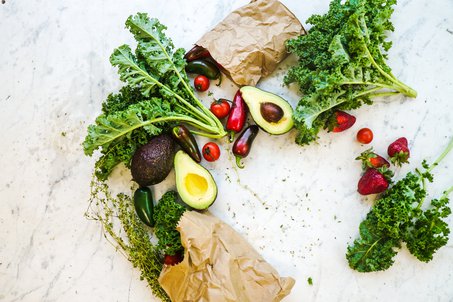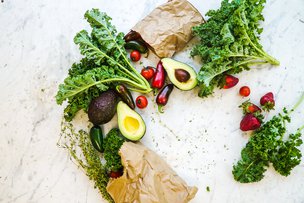
Though your body slows down as you get older, it’s important to continue making healthy choices to maintain your health and wellbeing as you age.
This includes staying active as much as possible and eating a healthy and balanced diet. However, healthy choices in your younger years may not be as beneficial for you now, especially when it comes to diets.
The diet you follow can impact your mental and physical health at any age, but the foods you eat as you age are particularly important because seniors are more prone to nutrient deficiencies and illness. Vegan and vegetarian diets are generally safe and healthy for most individuals, but some do find it difficult to get the proper amount of nutrients they need, such as calcium, protein, and vitamin B12.
As you are already more susceptible to deficiencies as a senior, it’s essential to be mindful of what foods you eat when following a vegan or vegetarian diet. It is not impossible or unsafe for older individuals to follow these diets, but you will have to take extra precautions to ensure you get the nutrients you need. As long as you get the proper amount of vitamins and other nutrients, there is no reason why you can’t maintain a healthy lifestyle as a vegan or vegetarian.
Nutritional Needs of Seniors
Everyone needs to eat a balanced diet no matter their age. Nutritional needs generally do not change as we get older. Seniors require the same amount of things like fat, fibre, and carbohydrates as younger individuals. However, seniors tend to have deficiencies because they are less active and burn fewer calories; meaning they don’t consume as much food to replace lost energy. Naturally, when we eat less, we consume fewer nutrients.
If you are already struggling to get the nutrients you need because you don’t eat as often, you will have to take extra precautions to ensure your meals are rich in vitamins and nutrients. Protein can be tough to get enough of on vegan and vegetarian diets, but seniors need protein to support strong and healthy muscles.
A lack of protein results in weak muscles, and weak muscles are the reason older adults are more prone to injury. Seniors following a vegan and vegetarian diet need to eat enough protein and stay physically active to boost their strength. In this case, protein is the one nutrient that seniors do need more of than younger individuals to maintain healthy muscles.
The Benefits of a Vegetarian and Vegan Diet for Seniors
Plant-based diets rich in fruits, vegetables, proteins, and whole grains benefit everyone as these are the food groups that everyone should eat to stay healthy no matter their diet. Though animal products are a great source of the essential nutrients we need, they are not the only source.
Vegans can get the protein, calcium, and iron they need from things like nuts, greens, lentils, tofu, soymilk, chickpeas, almond butter, and more. Vegetarians can consume the same foods as vegans to get the nutrients they need with the addition of certain animal products.
Both vegan and vegetarian diets provide significant health benefits for seniors, including:
- Increased lifespan
- Reduced risk of cancer and diabetes
- Healthier weight
- Increased cardiovascular health
- Lower cholesterol
- Lower blood sugar
- Lower blood pressure
- Helps with arthritis
- Overall reduction in the need for medications
Tips For Going Vegan and Vegetarian in Older Age
If you are over the age of 65 and considering switching to a plant-based diet, you need to take extra care in choosing meals rich in certain vitamins and nutrients and planning a healthy lifestyle. It’s easier for older adults to become nutrient deficient when they don’t consume as much food as they used to, so the meals they do eat need to be full of essential vitamins and nutrients. If you don’t eat enough nutrients, you won’t have enough energy for activities like exercise which is vital for your health as you age.
When eating a vegan or vegetarian diet as a senior, make sure you are:
- Eating enough protein: Seniors need higher intakes of protein to maintain strong and healthy muscles. Despite what many people think, numerous plant-based foods are rich in protein.
- Getting enough vitamins: calcium and vitamin D: As we age, our bodies change as a result, so it’s important to keep up with essential vitamins to stay healthy. Certain plant-based foods may lack certain vitamins, so to compensate you can always take supplements. To bolster your bone health, make sure you’re consuming enough calcium and vitamin D. To maintain your blood cell count and oxygen levels, eat foods or take supplements rich in iron and vitamin C. To regulate your nervous system and keep your energy up, eat foods high in B12 or start taking supplements.
- Exercising regularly: Moving your body is just as important as what you put into your body as you age. Just because you are following a healthy vegan or vegetarian diet does not mean you should stop exercising. Exercising regularly is key to maintaining your health and wellness as you get older.
Final Thoughts
Overall, vegan and vegetarian diets provide significant benefits to older populations so long as issues like nutrient deficiencies are avoided. However, some older individuals have been known to develop poor eating habits and even eating disorders due to a lack of interest in food. As plant-based diets can make it difficult to consume certain nutrients, developing an eating disorder in addition to a vegan or vegetarian diet can have severe health consequences.
If you are going to become a vegan or vegetarian as a senior, it’s important that you feel passionate about it and are dedicated to making appetizing nutrient-rich meals. The last thing you want as a person who already struggles to get proper nutrients is to feel disinterested in the foods that you are eating. However, if you can consume well-balanced nutrient-rich meals throughout your day, there is no reason why you can’t maintain a healthy lifestyle on a plant-based diet.

